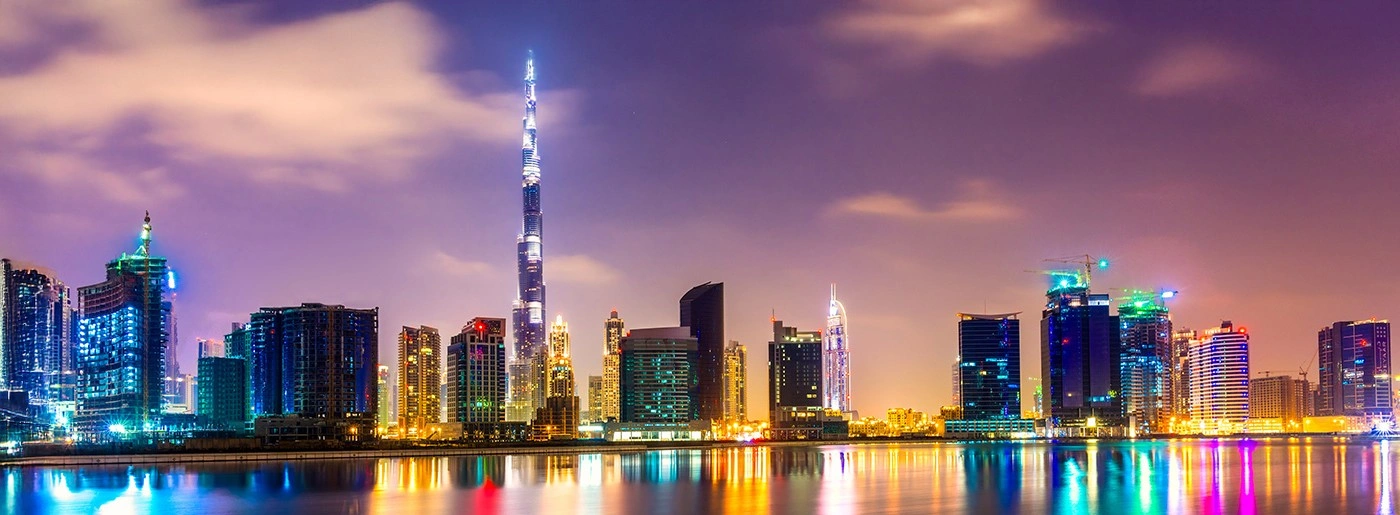
About Dubai Real Estate
Dubai’s remarkable rise as a global leader in business and modernization has earned it significant international recognition. The city has become a major hub for business, trade, and tourism, known for its dynamic, business-friendly environment and a proven track record in delivering large-scale projects. The government is committed to establishing Dubai as the world’s leisure and entertainment capital, with a target of attracting 15 million tourists by 2030. This modern, cosmopolitan city is home to over 185 nationalities, living in a vibrant international community, and has evolved into an iconic symbol of the 21st century. Dubai continues to pioneer groundbreaking projects, such as the USD 15 billion expansion of Emirates Airlines and the USD 4 billion development of Dubai International Airport, both reflecting its dedication to achieving its ambitious goals.
Historically, Dubai’s strategic location near India made it a significant port for traders. It was known for its pearl exports until the 1930s, but the industry declined due to the Great Depression and the impact of World War II. Border disputes among the emirates persisted even after the UAE’s formation. In the 1950s, when the British moved their local administrative offices from Sharjah to Dubai, the city established electricity, telephone services, and an airport. It also partnered with Qatar to create a new currency, the Qatar/Dubai Riyal, following the collapse of the Gulf Rupee. The discovery of oil in the same year spurred rapid development, as Dubai granted concessions to international oil companies. This led to a massive influx of workers, particularly from India and Pakistan, causing the population to grow by over 300% between 1968 and 1975.
On December 2, 1971, Dubai, along with Abu Dhabi and five other emirates, formed the United Arab Emirates after the British withdrawal from the Persian Gulf. In 1973, the UAE adopted a unified currency, the UAE dirham. Throughout the 1970s, Dubai continued to prosper from oil and trade revenues, even as Lebanese immigrants sought refuge from the civil war. In 1979, the Jebel Ali Free Zone was established, which included the Jebel Ali port—recognized as the world’s largest man-made port. This zone offered foreign companies unrestricted labor importation and capital export.
Today, Dubai is considered one of the most desirable real estate markets in the world, with the city’s rapid growth making it the fastest-expanding urban area globally. Its strategic location, at the crossroads of Europe, Asia, and Africa, has contributed to its rising prominence as a tourist destination, with visitor numbers soaring from 1.8 million to 5.4 million over the past decade. Dubai is a place where East meets West, blending traditional values with Western capitalist interests to become a formidable economic force. The city boasts numerous world records and “firsts,” including:
- One of the largest airports in the world
- The world’s largest man-made port
- The largest shopping mall on the planet
- The only 7-star hotel in the world
- The world’s largest theme park, projected to surpass Florida’s Disney parks in size
- The tallest skyscraper in the world
- Palm Jumeirah, the first man-made palm-shaped island
Dubai is also a tax-free haven, attracting expatriates who enjoy a high standard of living, with a variety of dining options, cafes, theaters, malls, clubs, and entertainment venues. The education system is solid, and the city’s growing job and business opportunities continue to attract global talent. The real estate market is thriving as well, contributing to Dubai’s ongoing success as a world leader in enterprise and modernization. The city’s visionary leadership has played a crucial role in making it a top destination for commerce, trade, housing, and tourism.
Additional Highlights of Dubai
- Outstanding Infrastructure
- Dubai Metro: One of the world’s most advanced metro systems, featuring driverless trains that link key areas throughout the city.
- Dubai Roads and Bridges: Dubai is known for its meticulously designed roads, impressive bridges, and well-maintained highways, ensuring efficient travel across the city.
- Architectural Wonders
- Burj Khalifa: Standing at 828 meters (2,717 feet), this is the tallest building on Earth, offering stunning panoramic views from its observation deck on the 148th floor.
- Burj Al Arab: The only 7-star hotel globally, recognized for its iconic sail-like design and luxurious offerings, located on its own island.
- Palm Jumeirah: The world’s first man-made island in the shape of a palm tree, home to high-end resorts, exclusive residences, and renowned restaurants.
- The Dubai Frame: A 150-meter-high landmark offering remarkable views of both old and new Dubai, symbolizing the city’s evolution.
- Luxury Shopping & Entertainment
- The Dubai Mall: The largest shopping mall in the world, featuring over 1,200 stores, an ice rink, an aquarium, and the famous Dubai Fountain.
- Dubai Opera: A state-of-the-art venue offering a wide range of performances, from opera and ballet to Broadway shows.
- Dubai Marina: A stunning waterfront district filled with luxurious high-rises, dining spots, and leisure activities.
- Mall of the Emirates: Known for Ski Dubai, the world’s first indoor ski resort, offering visitors skiing, snowboarding, and other snowy adventures year-round.
- Cultural and Heritage Attractions
- Al Fahidi Historical Neighborhood: A preserved district that showcases Dubai’s traditional architecture, including wind-tower houses and various museums.
- Dubai Museum: Housed in the historic Al Fahidi Fort, the museum presents Dubai’s transformation from a small fishing village to a bustling modern metropolis.
- Dubai Opera House and Cultural Centers: The city is rapidly becoming a cultural hub, with theaters, galleries, and live festivals attracting global artists.
- Beach Resorts & Outdoor Adventures
- Jumeirah Beach: A beautiful stretch of coast, home to luxury resorts and a popular destination for sunbathing and water sports.
- Desert Safaris: Visitors can explore the vast Arabian desert, experiencing thrilling dune rides, camel treks, and traditional Bedouin-style camps.
- Water Sports & Cruises: Dubai’s coastline offers a wide range of activities such as jet skiing, parasailing, and scenic dhow cruises on the Dubai Creek and Arabian Gulf.
- Business and Financial Powerhouse
- Dubai International Financial Centre (DIFC): A leading business hub in the Middle East, attracting global banks, law firms, and international corporations.
- World Trade Center: A central venue for exhibitions and major international events and conferences.
- Free Zones: Dubai offers various free zones, such as Dubai Silicon Oasis and Dubai Media City, where businesses benefit from tax incentives and simplified regulations.
- Tourism & Leisure
- Dubai Parks and Resorts: An expansive entertainment complex home to three theme parks—Motiongate, Legoland, and Bollywood Parks Dubai.
- Global Village: A large cultural and entertainment venue offering global pavilions, international cuisine, shopping, and live performances.
- Dubai Miracle Garden: The world’s largest flower garden, featuring more than 50 million flowers arranged in stunning and intricate designs.
- Sustainability & Green Initiatives A pioneering, sustainable city designed as a model for green living, featuring renewable energy sources and eco-friendly architecture.
- Masdar City:
- Dubai Solar Park: One of the world’s largest solar energy parks, supporting Dubai’s goal to generate 50% of its energy from renewable sources by 2050.
- Sustainable Developments: Dubai is committed to green construction and sustainability, with eco-friendly residential projects and urban planning.
- Dubai Vision 2040: As part of its commitment to long-term sustainability, Dubai’s Vision 2040 focuses on transforming the city into an environmentally sustainable, smart metropolis. This vision includes goals for reducing carbon emissions, increasing green spaces, and advancing energy-efficient technologies. Dubai aims to enhance its infrastructure by implementing more eco-friendly designs and promoting renewable energy use, all while ensuring sustainable urban growth. The vision prioritizes developing new transportation systems, expanding green areas, and fostering innovation in clean energy solutions, ultimately ensuring that Dubai remains at the forefront of sustainable development on a global scale.
- Global Events & Festivals
- Dubai Shopping Festival: An annual retail extravaganza offering incredible discounts, promotions, and entertainment that attracts millions of visitors.
- Dubai World Cup: The world’s richest horse race, drawing top-tier competitors and global attention each year.
- Dubai International Film Festival (DIFF): A premier Middle Eastern film festival that brings together international filmmakers, actors, and cinema enthusiasts.
- Multicultural Environment
- Diverse Population: With a vibrant expatriate community from around the world, Dubai is home to a rich cultural blend that makes it a global melting pot.
- Global Cuisine: The city offers a diverse range of culinary experiences, from Middle Eastern to Asian, European, and African flavors, catering to all tastes.
- Safety & Security
- Low Crime Rates: Dubai is one of the safest cities globally, with strict laws and regulations ensuring the safety of both residents and visitors.
- Advanced Surveillance System: The city employs cutting-edge security technology, including CCTV cameras, to maintain public safety and security.
- Transportation & Connectivity
- Dubai International Airport (DXB):
- Dubai International Airport (DXB): One of the busiest airports in the world, serving as a major hub for international travel, connecting millions of passengers globally every year.
- Al Maktoum International Airport (DWC): Located in the Jebel Ali area, Al Maktoum International is another major airport in Dubai. It is designed to be one of the largest airports in the world upon completion, with capacity to handle over 200 million passengers annually. This airport complements Dubai International by focusing on cargo and passenger services, and is part of the Dubai World Central (DWC) development, a vast, integrated logistics hub.
